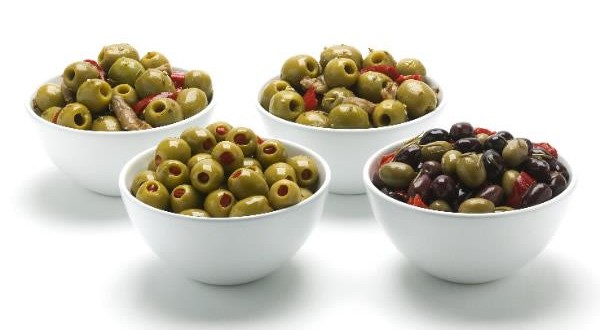Olives are one of the most widely enjoyed foods in the world. Though most people are used to think of them as a zesty vegetable that adds flavor to salads and meat and poultry dishes, olives are actually fruits of the Olea europea tree. They come in different varieties and are too bitter to be eaten right off the tree. Olives are then cured to reduce their bitterness.
Olives are known to be high in fat; nearly 85% of the calories in olives come from fat. However, it is their unusual fat quality that provides the most health benefits to anyone who consumes them regularly.
Regardless of variety, olives contain high levels of monounsaturated fatty acid, which has been associated with numerous health benefits. Olives are also a rich source of phytonutrients that function mostly as antioxidants and anti-inflammatory agents.
Here’s how olives and its health protecting nutrients can benefit your health.
Cardiovascular Health
Despite its size, olives offer a diverse range of antioxidants that help protect cells from damage caused by oxidative stress.
Free radicals are produced by the body as it interacts with oxygen and produces energy. Free radicals are highly interactive with other molecules found within cells. As such, they oxidize cholesterol molecules, causing them to stick to artery walls and build up plaque. This hardening and narrowing of arterial walls heightens the risk for heart disease and stroke.
Antioxidants help protect cardiovascular health by neutralizing free radicals. Olives are a good source of vitamin E, a powerful antioxidant, as well as more than 30 polyphenols, another group of powerful antioxidants.
These polyphenols provide additional cardiovascular benefit by functioning as anti-inflammatory agents. Chronic inflammation can damage blood vessels. Damaged blood vessels are prone to rupture and thrombosis, thus raising the risk for heart attack and stroke.
The type of fats found in olives, particularly the monounsaturated fatty acid oleic acid, the essential fatty acid linoleic acid and the omega-3 fatty acid alpha-linoleic acid also help reduce the risk for heart disease when eaten in moderation and used to replace saturated and trans fats in a diet. Replacing saturated and trans fats with monounsaturated fat in effect helps reduce the level of bad cholesterol.
Cancer Prevention
Studies show that chronic inflammation and oxidative stress are among the most important factors in the development of disease, including cancer. Olives can help lower our risk of developing cancer by providing a rich supply of antioxidants and anti-inflammatory nutrients.
Research on breast cancer has identified erythrodiol, uvaol and oleanolic acid, triterpene phytonutrients found in olives, as beneficial for cancer treatment. These phytonutrients have shown to have the ability to interrupt the life cycle of cancer cells. Another phytonutrient, oleocanthal, is said to mimic the effects of ibuprofen in reducing inflammation, effectively lowering the risk for breast cancer and its recurrence.
Other researches are looking at the other nutritional components of olives, such as Squalene and lignans, and their possible effects on cancer.
Weight Loss
Studies revealed that consuming monounsaturated fats in place of saturated or trans fats can also help in weight loss and weight management. In a 2013 issue of the “Diabetology and Metabolic Syndrome” showed that a diet high in monounsaturated fat, i.e. olive oil, lead to lower cholesterol levels and less weight gain than diets high in saturated fat or margarine.
Another study in a 2011 issue of the “European Journal of Endocrinology” showed that a diet high in olive oil in place of other kinds of fat resulted in lowered weight gain. The researchers alluded the result to the olive oil’s high monounsaturated fatty acid content.
Digestive Health
Studies show that maslinic acid, a tirterprenoid compound found in olive skin, help fight cancer cells. A combined team of researchers from the University of Granada and the University of Barcelona showed that treatment using maslinic acid can hamper the growth of colon cancer cells. Treatment with maslinic acid has also been shown to cause apoptotic death in cancerous cells.
Olives are also good sources of fiber. One hundred grams of olives provides about 3.2 grams of the total recommended daily intake of dietary fiber. The recommended daily fiber intake for men is 38 grams and 25 grams in women. Insoluble fiber promotes digestive health by adding bulk to the stool and promoting the movement of materials in the digestive system.
Protection Against Anemia
Olives are rich sources of iron, an essential mineral component of hemoglobin. Hemoglobin is the substance in red blood cells that carries oxygen from the lungs and transports it throughout the body. Without enough iron, the body can’t make enough red blood cells and could lead to iron deficiency anemia.
Ripe olives contain about 3.30 grams of iron for every 100 grams. The recommended dietary allowance for iron for adult males is 18 mg, while women have varying daily iron needs depending on her age. Because women lose blood during their period, women aged from 19 to 50 need 18 mg of iron daily. After menopause, a woman’s daily iron needs drops to 8.0 mg.
Hair and Skin Health
The copious antioxidants found in olives can do more than benefit the heart. AS antioxidants help prevent cell damage, olives can help inhibit the signs of aging and contribute to a more youthful appearance.
Chief amongst these is Vitamin E. Aside from countering the damaging effects of free radicals; this potent antioxidant has also been shown to protect the skin from ultraviolet radiation. UV rays are known to cause skin cancer and premature aging.
Eye Health
Olives are rich sources of vitamin A, the vitamin that is needed for good eyesight. It is an essential component of rhodopsin, a protein that absorbs light in the light sensitive cells in the retina. Vitamin A is also essential to vision as it supports the normal differentiation and function of the cornea and conjunctival membranes. Studies also show that people who eat foods rich in vitamin A are have lower risk of developing age related macular degeneration and cataracts.
The daily recommended dietary allowance for vitamin A for men is 900 micrograms (3,000 IU) and 700 micrograms (2,300 IU) for women. A cup of olives provides about 10% of the recommended dietary allowance for vitamin A.













